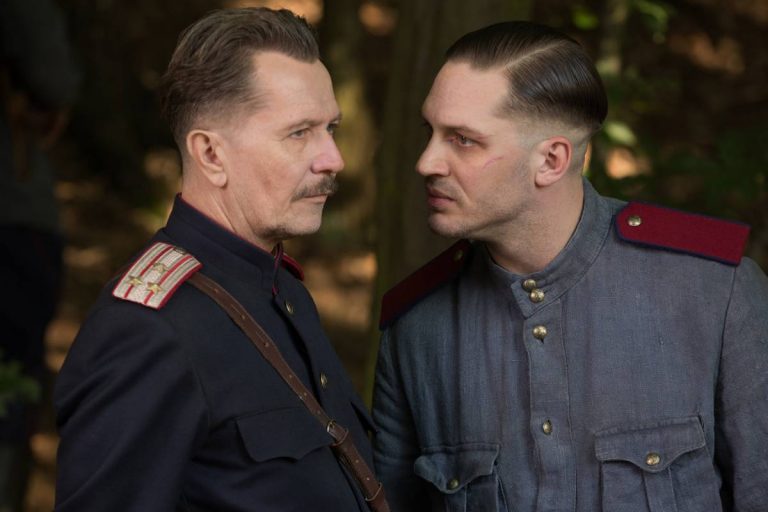‘Gripping’, ‘masterful storytelling’ and ‘a nerve-wracking pace and atmosphere’. These are words that critics used to describe Tom Rob Smith’s murder mystery novel in 2008, but unfortunately this certainly isn’t terminology that can be attributed toward Daniel Espinosa’s underwhelming and forgettable adaptation.
Child 44 follows hardened war hero Leo Demidov, a disgraced MGB Agent and former orphan as he attempts to investigate a series of shocking child murders in 1950’s Russia.
A cold war murder mystery, political intrigue, strong social commentary and delving historical exploration, all in Stalinist Russia, Child 44 has the ingredients of a masterpiece. However, most of this potential is squandered in an uneven, incoherent and at times, tedious adaptation. I write this review with a heavy heart and slow, gut-wrenching feeling of frustration, as having not read the book but being long aware of its intriguing and brow raising story, Child 44 is sadly a hugely wasted opportunity. A film severely lacking in focus and pace that contains of none of the fast paced, nail biting tension you would come to expect from a story of this kind.
Child 44 is heavily burdened with a poorly adapted screenplay in which far too much is unnecessarily crammed in for no apparent reason. The story seems hell bent on back benching its fascinating and exciting murder mystery tale in favour of developing far too many inane characters subplots. In fact, the entire film seems to be comprised of numerous subplots. There is no focused through line to speak of, no “main” plot to move the story forward in exhilarating ways. The hunt for the child murderer is too muddled due to the story’s incessant, constant and unbalanced need to leapfrog between the abundance of separate plot threads. Demidov’s domestic troubles may have been wonderfully interweaved in the novel but here, they become one of many heavy weighing anchors preventing Child 44 ascending to new heights. With the unstoppable rise of Television blazing it’s away across Hollywood like Stalin’s relentless rise to power, it became blatantly apparent not 40 minutes into this particular story that perhaps it should have been told on the smaller screen, across multiple parts, in which it would have had time to breathe; its characters would have ample time to develop and the span of time seem far more plausible.
[Tweet “”Child 44 is sadly a hugely wasted opportunity””]Joseph Stalin once said: ‘Death solves all problems – no man, no problems’.
How’s that for an uplifting and confidence boosting message from your supreme leader? Which brings me onto, arguably, Child 44’s biggest drawback, its direction, a story and era such as this, craves the need for a director with a bold voice and distinct vision. Think David Fincher, think Cary Fukunaga or more recently think ‘71’s Yann Demange. Instead, producer Ridley Scott went with Safe House director Daniel Espinosa. Espinosa’s drama may follow the murders of 44 children but the film’s biggest crime was its complete inability to create a vivid, visceral or commanding world. Much of the film is spent listening to characters talk to one another about how oppressive and terrible Russia has become, but none of that actually makes it on screen. The Stalinist Russia that Espinosa and co. creates simply isn’t bleak or enthralling. Tom Rob Smith’s novel takes place mostly in the harsh, blistering snow swept landscape of Moscow, Volsk and Rostov. However, Espinosa’s world mainly takes places in lushes green forest and picturesque golden fields, all in lovely sunny weather (with the occasional CGI shot of an industrial gloomy city to remind us). The film’s biggest failure is that is never fully immerses you. The costumes, props and set design are all flawless and seemingly authentic but when you never quite feel you are living in or being absorbed into this desolate nightmare, you know something is wrong.
There was nothing distinctive or creative about Espinosa’s direction. There wasn’t a hint of a particularly daring cinematic style or exciting visual flair. It was blandly presented, the cinematography flat and uninspired. Espinosa seemed intent on shaking the camera and cutting at faster pace with no foreseeable motivation in attempt to create the façade of a transfixing fight scene. The film’s soundtrack was additionally baffling and rather lackluster, often becoming very distracting and unnecessary. The casting of superb acting talents like Tom Hardy and Gary Oldman amount to nothing more than serviceable performances in which they have to spout out unimaginative and unremarkable dialogue. All in slightly incoherent and sometimes distracting accents, which you’ll be mimicking on your way home from the theatre. In short, while on paper this film seemed like a sure winner, it is ultimately a hugely wasted, misguided opportunity. A failed attempt that is far too bloated and distracted within it’s own tale for it’s own good. A sadly forgettable film that will frustratingly fall between the cracks and float gradually down into кино чистилище (that’s Russian for ‘Movie Purgatory’).
Trains and railway lines feature frequently throughout Child 44 and become a motif of the movie. It’s a crying shame, if only the film was as focused and fast moving as a roaring train blazing its way across a deprived and bleak snow-swept Russia.
Some of the coverage you find on Cultured Vultures contains affiliate links, which provide us with small commissions based on purchases made from visiting our site.

